Imagine looking in the mirror and seeing a perfect smile that feels completely natural – that’s the power of a well-crafted dental implant crown. As someone who’s witnessed countless patients transform their confidence through this remarkable dental solution, I can tell you that understanding the intricacies of dental implant crowns is crucial for making informed decisions about your oral health.
A dental implant crown represents the visible, functional part of your dental implant system – the part that looks, feels, and functions just like your natural tooth. It’s the culmination of advanced dental engineering that has revolutionized how we replace missing teeth, offering a permanent solution that can last decades with proper care.
Key Takeaways
- Dental implant crowns are the visible tooth-like caps that attach to dental implants, providing natural appearance and full functionality
- Three main materials are used: porcelain, zirconia, and porcelain-fused-to-metal, each with distinct advantages
- The crown placement process typically takes 3-6 months from start to finish, allowing proper healing between stages
- Proper maintenance can help your dental implant crown last 15-25 years or longer
- Cost considerations include material choice, complexity of the case, and geographic location, with various financing options available
What Is a Dental Implant Crown? 🦷
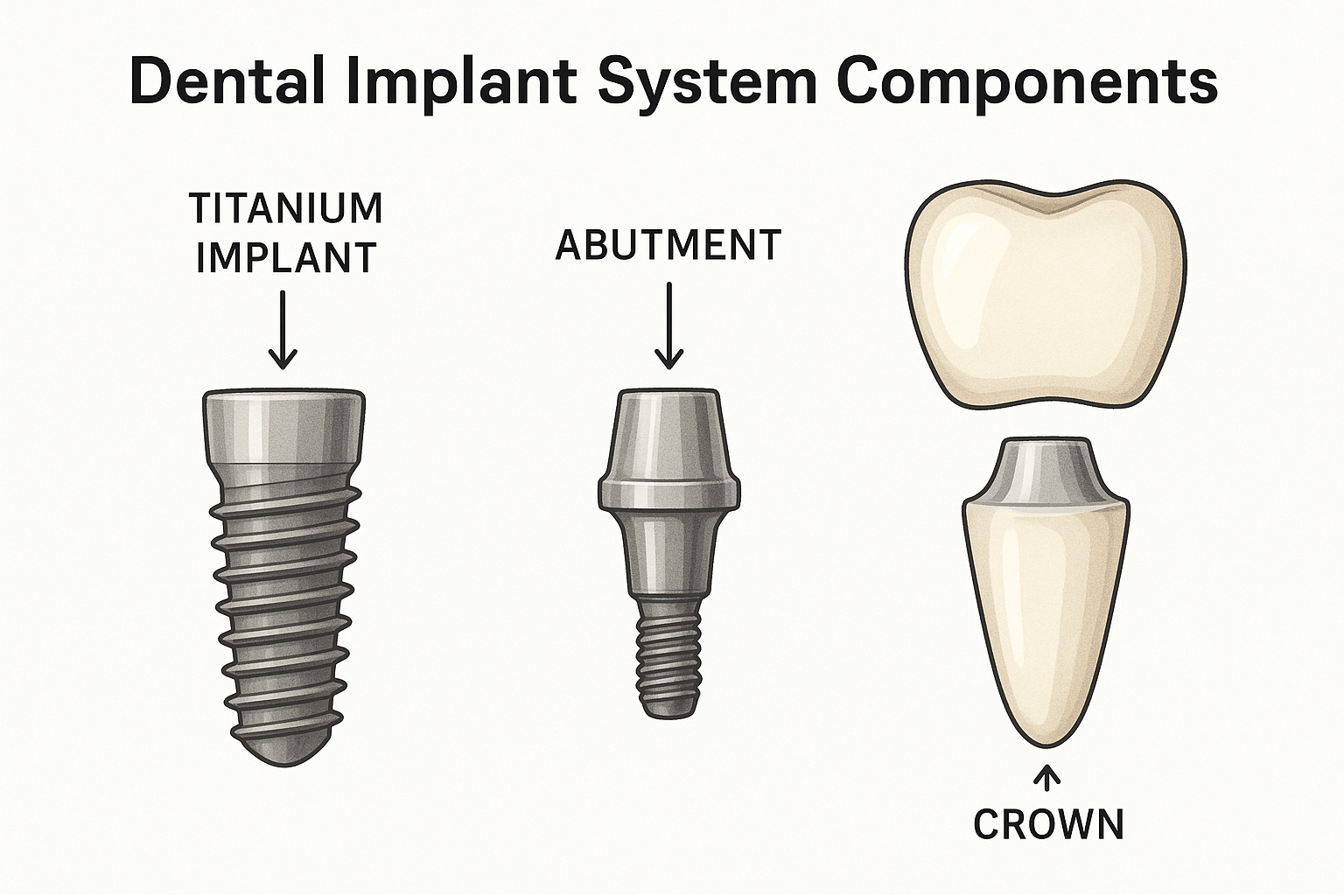
A dental implant crown is the prosthetic tooth that sits atop a dental implant, completing the tooth replacement system. Think of it as the visible “tooth” part of your implant – it’s what you see when you smile and what you use to bite and chew food.
The dental implant system consists of three main components:
- The implant (titanium screw placed in the jawbone)
- The abutment (connector piece)
- The crown (the artificial tooth)
How Dental Implant Crowns Differ from Natural Teeth
While dental implant crowns are designed to mimic natural teeth, there are some key differences:
| Aspect | Natural Tooth | Dental Implant Crown |
|---|---|---|
| Root System | Natural root with ligaments | Titanium implant fused to bone |
| Sensation | Full nerve sensation | No nerve sensation |
| Maintenance | Prone to decay | Cannot decay (but gums need care) |
| Durability | Can last lifetime with care | 15-25+ years typically |
| Appearance | Natural enamel | Crafted to match natural teeth |
Types of Dental Implant Crown Materials
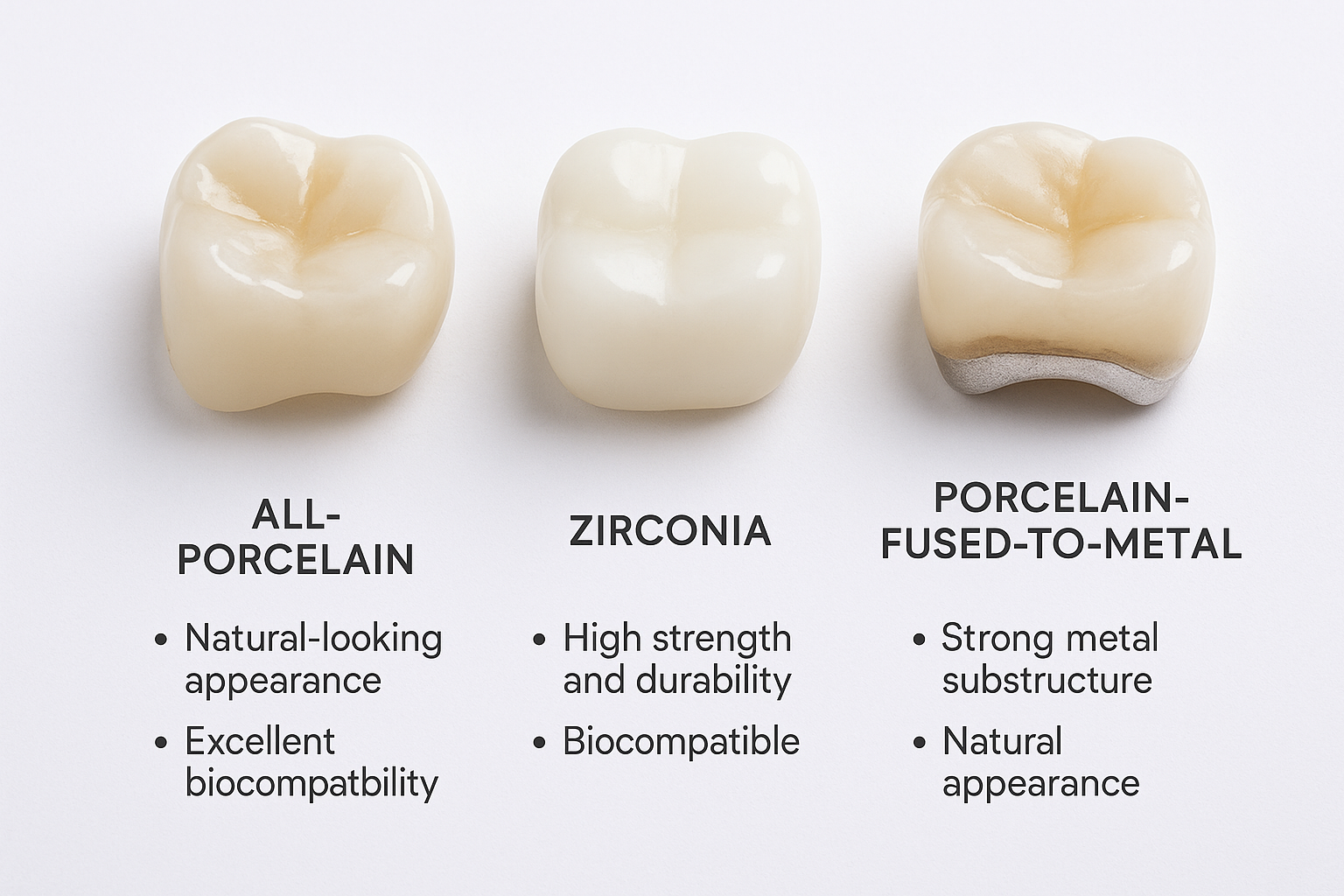
Choosing the right material for your dental implant crown is crucial for both aesthetics and longevity. Let me walk you through the three primary options:
1. All-Porcelain Crowns ✨
Advantages:
- Most natural-looking option
- Excellent color matching
- Biocompatible
- Stain-resistant
Best for: Front teeth where aesthetics are paramount
2. Zirconia Crowns 💪
Advantages:
- Extremely durable
- Natural appearance
- Metal-free
- Excellent for patients with metal sensitivities
Best for: Both front and back teeth, especially for patients who grind their teeth
3. Porcelain-Fused-to-Metal (PFM) Crowns
Advantages:
- Strong and durable
- Cost-effective
- Proven track record
- Good for back teeth
Considerations: May show metal lines at the gum line over time
“The material choice for your dental implant crown should balance aesthetics, durability, and your specific oral health needs. I always recommend discussing your lifestyle and preferences with your dentist to make the best choice.” – Dr. Sarah Johnson, Prosthodontist
The Dental Implant Crown Process: Step-by-Step
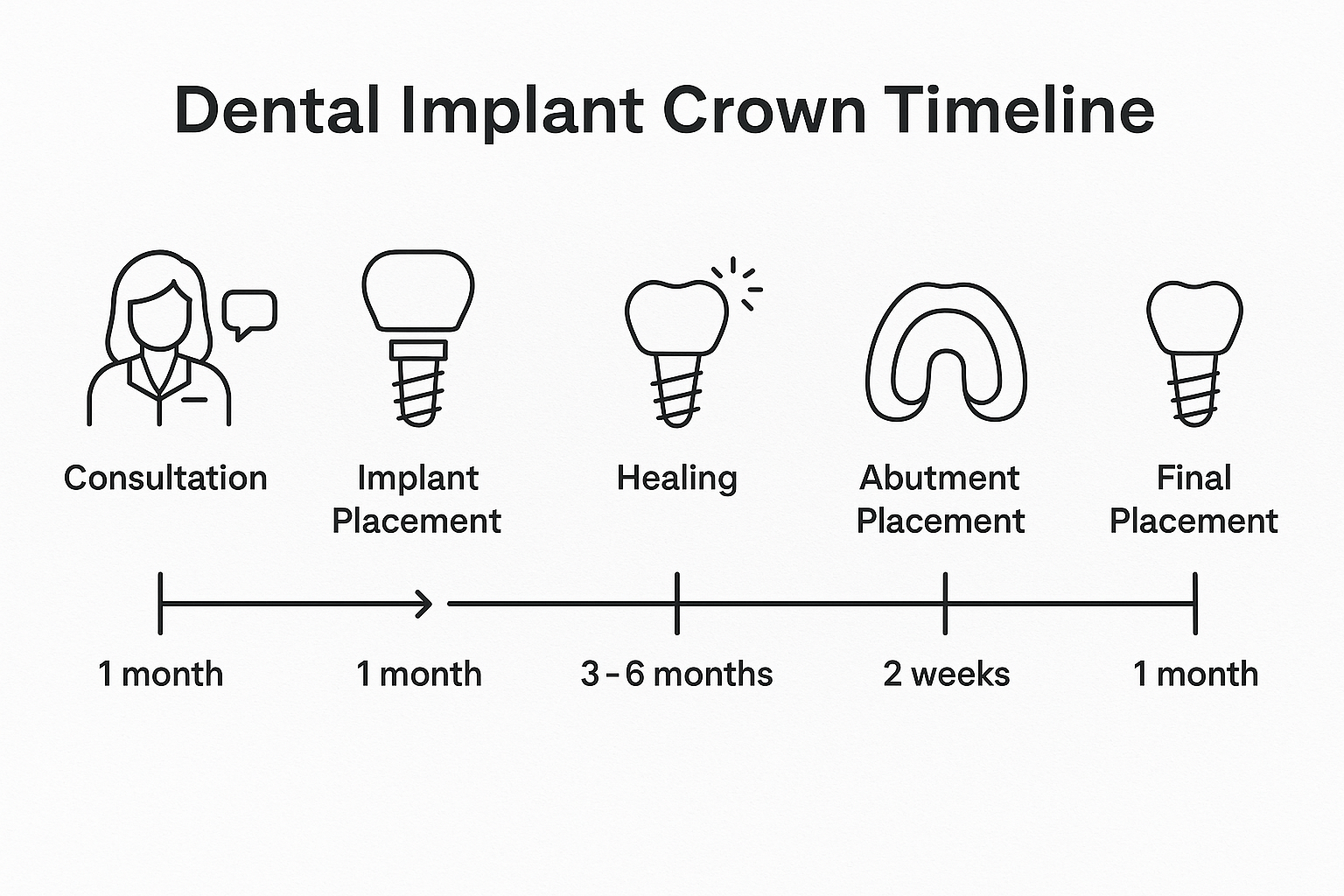
Understanding the dental implant crown process helps set realistic expectations. Here’s what typically happens:
Phase 1: Initial Consultation and Planning (Week 1-2)
- Comprehensive oral examination
- 3D imaging and X-rays
- Treatment planning
- Cost discussion and payment plan options
Phase 2: Implant Placement (Month 1)
- Surgical placement of the titanium implant
- Temporary crown placement (if applicable)
- Healing period begins
Phase 3: Osseointegration (Months 2-4)
- Bone grows around and fuses with the implant
- Regular check-ups to monitor healing
- Temporary restoration maintenance
Phase 4: Abutment Placement (Month 4-5)
- Minor procedure to attach the abutment
- Gum shaping around the abutment
- Final crown impressions
Phase 5: Crown Fabrication and Placement (Month 5-6)
- Custom crown creation in dental lab
- Final fitting and adjustments
- Permanent crown attachment
Benefits of Dental Implant Crowns
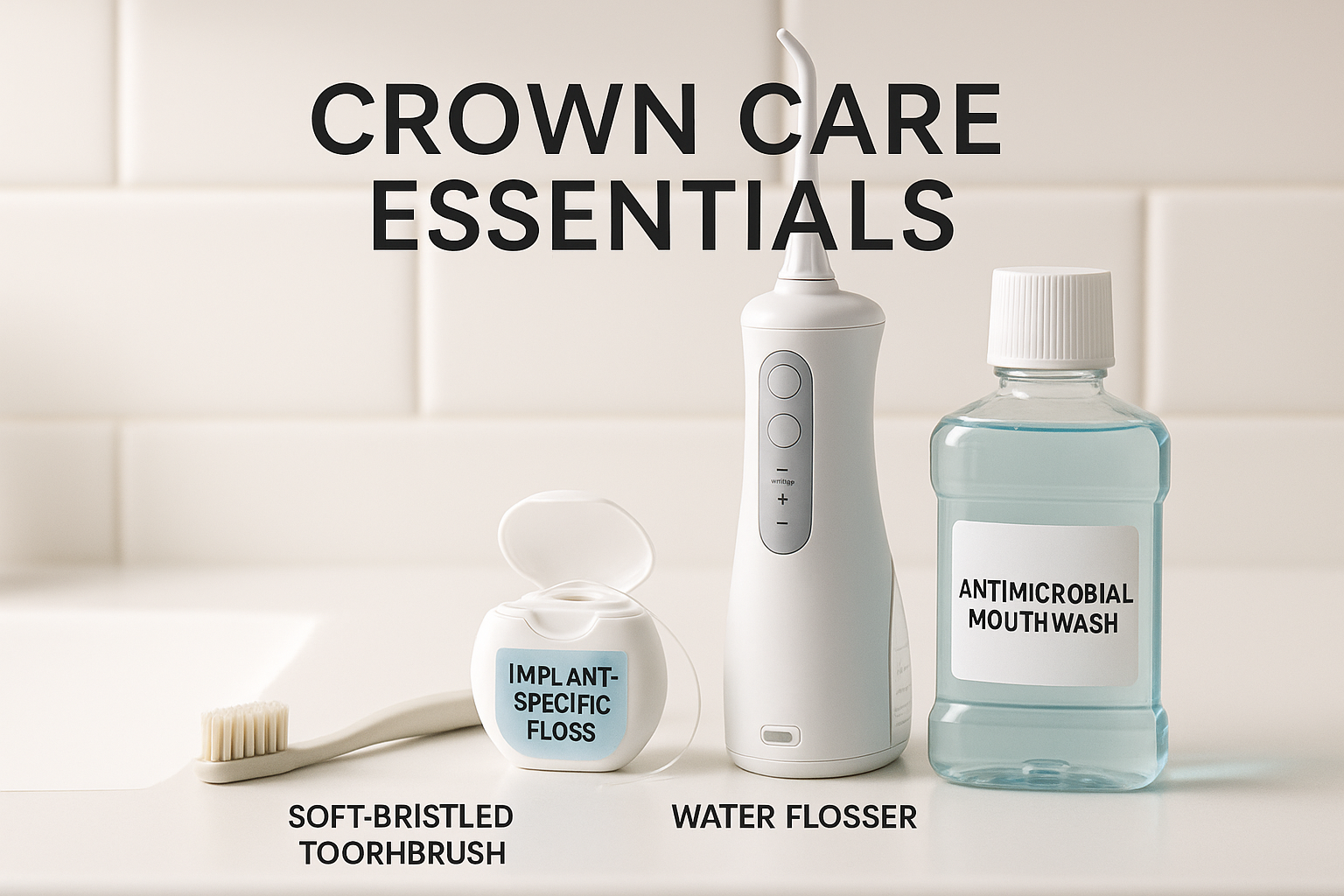
The advantages of choosing a dental implant crown over other tooth replacement options are substantial:
Functional Benefits
- Natural chewing ability – Bite force similar to natural teeth
- Speech clarity – No slipping or clicking sounds
- Jawbone preservation – Prevents bone loss that occurs with missing teeth
- Adjacent tooth protection – No need to modify healthy neighboring teeth
Aesthetic Benefits
- Seamless integration – Looks identical to natural teeth
- Gum health – Supports healthy gum tissue growth
- Facial structure – Maintains natural facial contours
- Confidence boost – Smile without worry or embarrassment
Long-term Benefits
- Durability – Can last 15-25+ years with proper care
- Stability – No movement or shifting
- Easy maintenance – Care for them like natural teeth
- Cost-effectiveness – One-time investment for long-term solution
Caring for Your Dental Implant Crown
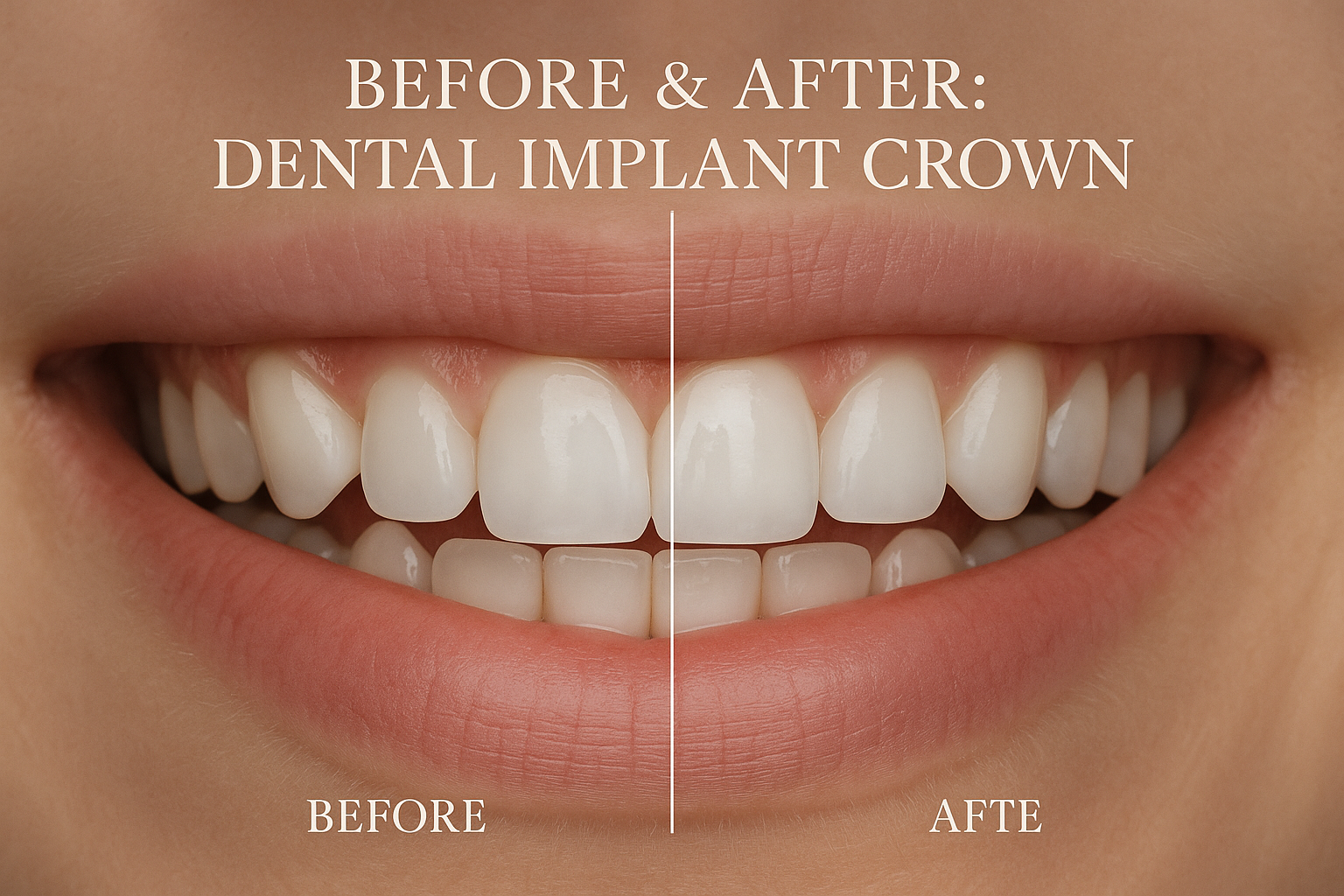
Proper maintenance ensures your dental implant crown serves you well for decades. Here’s my recommended care routine:
Daily Care Essentials
- Brush twice daily with a soft-bristled toothbrush
- Floss daily using implant-specific floss or water flosser
- Use antimicrobial mouthwash to prevent gum disease
- Avoid hard foods that could damage the crown
Professional Maintenance
- Regular cleanings every 6 months
- Professional monitoring of implant health
- X-rays to check bone levels annually
- Immediate attention for any concerns
Warning Signs to Watch For 🚨
- Loose or wobbly crown
- Pain or discomfort around the implant
- Swelling or bleeding gums
- Changes in bite or crown fit
🦷 Dental Implant Crown Cost Calculator
💰 Your Estimated Cost Breakdown
Cost Considerations for Dental Implant Crowns 💰
Understanding the financial investment in a dental implant crown helps you plan effectively. Several factors influence the total cost:
Primary Cost Factors
Material Selection
- All-Porcelain: $1,200 – $2,000
- Zirconia: $1,500 – $2,500
- Porcelain-Fused-to-Metal: $1,000 – $1,800
Geographic Location
- Urban areas typically cost 15-25% more
- Suburban areas represent average pricing
- Rural areas may offer 10-15% savings
Complexity Factors
- Simple cases: Standard pricing
- Bone grafting needs: +$800 – $2,200
- Sinus lift requirements: +$1,500 – $2,500
- Multiple crowns: Potential volume discounts
Making Treatment Affordable
Many patients worry about factors affecting implant cost, but several options can help manage expenses:
- Insurance coverage – Many plans cover 50-80% of crown costs
- Flexible payment plans – Spread costs over 12-24 months
- HSA/FSA accounts – Use pre-tax dollars for treatment
- Dental financing – Specialized healthcare credit options
For Dallas residents specifically, there are numerous affordable implant options and strategies to save money on dental implants.
Choosing the Right Dental Professional
Selecting the right provider for your dental implant crown is crucial for success. Here’s what to look for:
Essential Qualifications
- Board certification in oral surgery or prosthodontics
- Extensive implant experience (ask about case numbers)
- Advanced training in implant dentistry
- State-of-the-art technology including 3D imaging
Questions to Ask Your Dentist
- How many implant crowns do you place annually?
- What is your success rate with implant crowns?
- Can you show me before/after photos of similar cases?
- What warranty or guarantee do you provide?
- How do you handle complications if they arise?
When searching for dental implant specialists, prioritize experience and patient satisfaction over the lowest price. The right provider ensures your dental implant crown will serve you well for decades.
Common Concerns and Solutions
“Will My Crown Look Natural?”
Modern dental implant crowns are virtually indistinguishable from natural teeth. Advanced materials and digital design technology ensure perfect color matching and natural contours.
“How Long Will It Last?”
With proper care, most dental implant crowns last 15-25 years or longer. The implant itself can last a lifetime, and crowns can be replaced if needed.
“Will It Feel Different?”
Initially, you may notice slight differences, but most patients adapt within 2-4 weeks. The crown will feel stable and secure, unlike removable dentures.
“What If Something Goes Wrong?”
Complications are rare (less than 5% of cases), but choosing an experienced provider and following post-operative instructions minimize risks.
The Future of Dental Implant Crowns
The field of dental implant crowns continues evolving with exciting developments:
Emerging Technologies
- Digital smile design for perfect aesthetic planning
- Same-day crowns using CAD/CAM technology
- Improved materials offering enhanced durability
- AI-assisted design for optimal fit and function
Enhanced Patient Experience
- Reduced treatment times through improved techniques
- Better pain management protocols
- Virtual consultations for initial planning
- Improved success rates through advanced materials
Conclusion
A dental implant crown represents one of the most significant advances in modern dentistry, offering a permanent solution that restores both function and confidence. From understanding the different material options to navigating the treatment process, making an informed decision requires careful consideration of your specific needs, budget, and long-term goals.
The investment in a dental implant crown pays dividends in improved quality of life, oral health, and self-confidence. With proper care and maintenance, your crown can serve you faithfully for decades, making it one of the most cost-effective dental treatments available.
Your Next Steps:
- Schedule a consultation with a qualified implant dentist to assess your candidacy
- Discuss material options based on your aesthetic and functional needs
- Review financing options to make treatment affordable
- Plan your treatment timeline to fit your schedule and healing requirements
- Commit to excellent oral hygiene to ensure long-term success
Remember, choosing the right provider is just as important as choosing the right treatment. Take time to research how to choose a dental implant dentist and don’t hesitate to seek multiple opinions for complex cases.
Your smile is worth the investment, and a dental implant crown can provide the natural-looking, long-lasting solution you deserve. Start your journey toward a complete, confident smile today by taking that first step and scheduling your consultation.

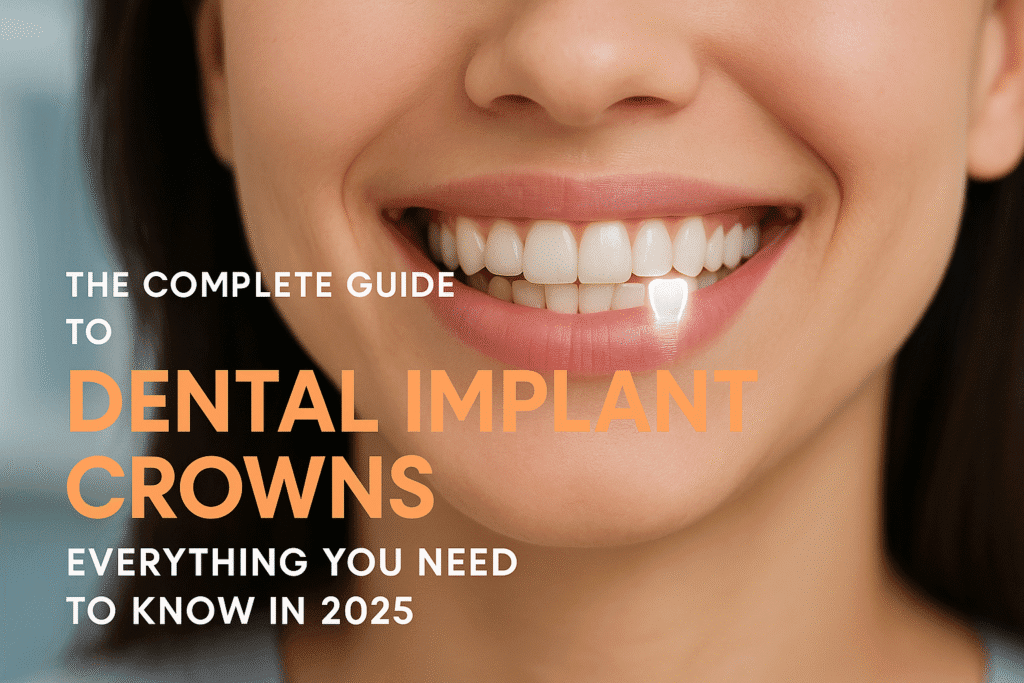
Leave a Reply
Share your thoughts or ask a question about dental implants. Your email address will not be published.